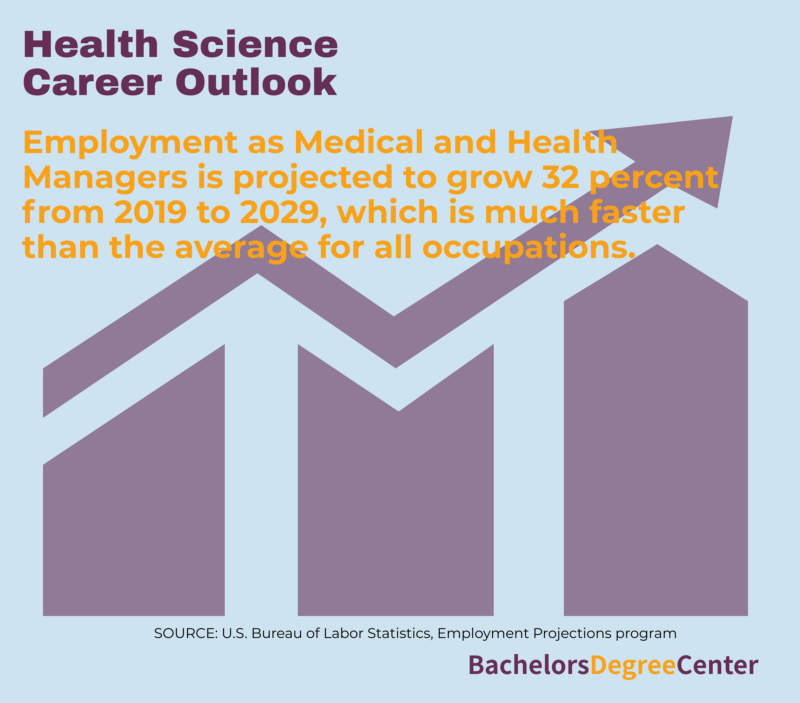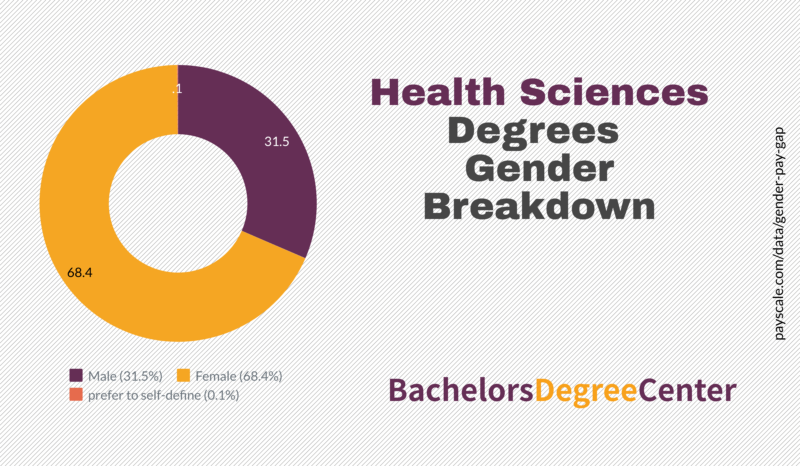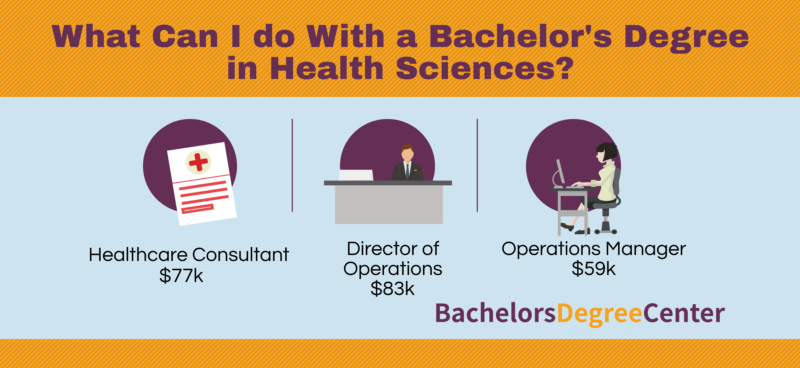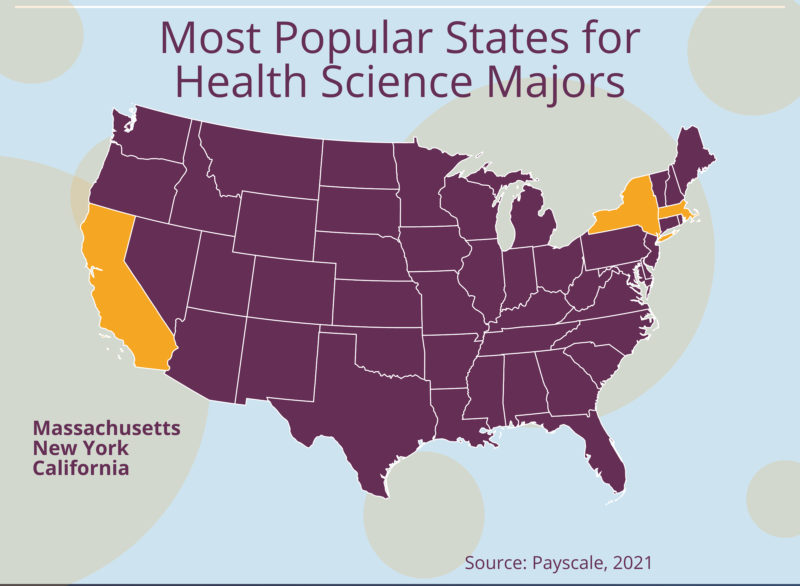Key Information:
- A health science degree opens doors to various fields such as physical therapy, medical sonography, health education, and more.
- Depending on the career, requirements can range from short-term certificates to advanced degrees.
- Many programs offer specializations in areas like healthcare administration, emergency management, or gerontology.
Careers with a health science degree vary widely, and there are too many to list. However, it’s possible to look at the sampling of careers with a health science degree to get a better idea of what to do with a degree in health sciences. If you want to know what to do with a health science degree, look no further.
A degree in health science careers could be applied to numerous health professions, such as physical therapy, occupational therapy, or other forms of medicine. Some careers with a degree in health science require a two-year degree such as a dental hygienist while other health science degree careers require a master’s degree or beyond.

For those wondering what can you do with a health science degree, here are a few bachelor of health science jobs to consider:
- Behavior analyst
- Patient care advocate
- Doctor
- Hearing aid specialist
- Registered medical sonographer
- Pharmacy sales representative
- Health educator
- Registered radiologic technologist
- Community health worker
- Mental health counselor
- Registered dietitian
- Physical or occupational therapist
- Research assistant or associate
Keep in mind that many degree in health science careers require a certification or licensing.
Careers with a degree in health science consist of two main types, as follows:
- Health science degree careers at the entry-level. Getting a two-year degree or certification can help you hone in on what job opportunities most appeal to you. These degrees allow you to begin working and keep your options open for further education.
- Careers that require a Bachelor of Science in Health Science. Some fields require specialization such as pre-pharmacy, pre-occupational therapy or pre-physical therapy. Choosing these paths allows you to prepare for health science major jobs or graduate school.
Accreditation for Health Science Degree Programs
The best college for health science should include an institution with the proper regional and national accreditation. Reputable colleges with health science major programs take the necessary steps to prove their academic rigor by going through the accreditation process. When students choose the best college for health science, national and regional accreditation should be one of the primary factors for their selection. Let’s take a closer look at the accreditation process for colleges and universities, including colleges with health science major programs.
The Commission on Accreditation of Allied Health Education Programs is an accreditation body specific to Health Sciences. CAAHEP has a committee on accreditation that reviews the credentials of more than 2,100 programs in 32 fields. When considering health science online degrees, students should determine whether each goal has a CAAHEP accreditation. There are many health sciences degree online and on-campus options. However, students can immediately rule out health science degrees online schools without the right credentials.
CAAHEP is one of the largest accreditors for health sciences and it evaluates online degree in health science programs for program content and quality. Once they obtain accreditation, colleges and universities cannot rest on their laurels. Instead, they submit to an ongoing evaluation to ensure they keep up with standards and guidelines demanded by each profession. CAAHEP belongs to the Association of Specialized & Professional Accreditors (ASPA).
Besides CAAHEP accreditation, the Council for Higher Education Accreditation (CHEA) recognizes other regional or national accreditations.
Regional vs. National Accreditation
Prior to selecting an online bachelor’s in health science, students need to understand the difference between regional and national accreditation. Both are important but they are two different criteria that may be applied to the quality of a bachelor of health sciences online.
Regional Accreditation is the main accreditation type for colleges and universities in the United States. Many online bachelors of health science degree programs and 85% of all colleges have regional accreditation recognized by the US Department of Education. These health science bachelor degrees have undergone rigorous testing to ensure they meet the standards expected of institutions of higher learning. Grad schools and future employers care about regional accreditation and students may not get financial aid if they choose a program that has not received the proper accreditation.
Regionally accredited schools are nonprofit or state-owned and fall under one of the six agencies that oversee the accreditation process in their region:
- New England Association of Schools and Colleges
- Middle States Commission on Higher Education
- Northwest Commission on Colleges and Universities
- Southern Association of Colleges and Schools
- Higher Learning Commission
- Western Association of Schools and Colleges
Schools with national accreditation focus on vocational and trade degrees. Some health science degrees fall under this category, including online degree in health science programs. National accreditation takes place every three to five years instead of every 18 months to three years as per regional accreditation. CAAHEP is an example of a national accreditation agency for online bachelor of health science degrees. There are many agencies that evaluate specific programs such as an online bachelor’s degree in health science. Whereas national accreditation applies to the entire college or university, regional accreditation applies to specific programs. Many regional agencies are recognized by the US Department of Education, but they don’t have geographic limitations.

Types of Health Science Degrees
Health science degrees are versatile and give students a chance to choose a broader degree or specialize in their area of interest. Health science bachelor degrees often involve taking courses in interdisciplinary programs. Students study animal and human health from a variety of perspectives. For people, this includes mental health and related disciplines such as psychology and counseling.
Like many other fields of study, health science online degrees give students a chance to choose which specialization they wish to go into. Most health science degrees fall within the baccalaureate level with options to specialize further with a master’s degree. However, there are also many opportunities for those who wish to pursue an associate’s health sciences degree online.
Health science degrees online provide students with foundational skills to fulfill various roles in healthcare. Some students go on to receive certificates in areas of Health Science to deepen their knowledge and enhance their practice. Some schools specialize in particular niches. This is a good thing to research before choosing a school for an online bachelor’s in health science.
With a bachelor of health sciences online, students can often choose between a more general degree or immediately choose a specialized degree for particular job roles. With an online bachelor of health science degree, students already working in health care or other fields can pursue their career, bring home a paycheck, and meet family obligations, all while attaining their degree.
Broad-based online bachelor’s degree in health science programs prepare students to work in a variety of settings. This gives graduates flexibility when it comes to choosing between continuing their education and pursuing jobs in healthcare.
Other online bachelors of health science degree programs require students to specialize and follow a tighter career path. This is the way to go for those who already know what they want to do and want to take the shortest route to get their education.
What can you do with a bachelor’s in health science? Areas of specialization may include the following:
- Radiography Advanced Patient Care
- Pre-Pharmacy
- Nuclear Medicine
- Pre-Physician Assistant
- Diagnostic Medical Sonogr
- Computer Tomography
- Family Dynamics
- Pre-Physical Therapy
- Biomedical Sciences
- Clinical Research Administration
- Post-PTA
- Health Care Quality
- Trauma
- MRI
- Global Health
- Healthcare Informatics
- Regulatory Affairs
- Aging Studies
- Healthcare Administration
- Child Health
Certifications/Licenses for Health Science Professionals
Health science certifications are useful for students who want to change careers to health sciences or to health science professionals who want to deepen their knowledge in a particular area.
Students can choose from a variety of health science certifications. Some employers require certain programs or tracks as a condition of employment. There are myriad health sciences certificate programs available. Students can meet with advisors or talk with a mentor regarding the best career path for particular health sciences jobs.
Choosing a health science certificate online allow students to get their degree from the comfort and security of home.
The National Health Science Certificate (NHSC) is one of the major certificate programs available to health science professionals. The certificate offers for cumulative certificates including the following:
- Foundation of Healthcare Professions
- Essentials of Healthcare Practices
- Human Structure, Function and Disease A & B
Students who obtained their NHSC have proven their commitment to improving the Health Science field. These certificate holders emerge from their program prepared to meet the needs of their patients and employers.
This certificate program aligns with the expectations of the National Health Science Standards. Students who obtain this certification often go on to leadership positions that move the field forward.
Certifications are also a great way to brush up on certain practice areas. Students who want to change jobs within the health sciences field often take certifications to boost their resume and to gain knowledge that will open other job roles to them.

Careers in Health Science
What job can you get with a health science degree? Jobs with a health science degree range from becoming a dental hygienist to a physical therapist assistant. Health science bachelor degree jobs include certificates and bachelor’s degrees that lead to jobs in animal or human health care. Some bachelor degree in health science jobs involve mental health treatment professionals such as psychologists.
Many people start careers in the healthcare system with an associate degree, but the healthcare field is large. Medical professionals in healthcare jobs often need a graduate degree, licensure, and coursework in a specialty.
What jobs can you get with health science degree? Some bachelor of health science degree jobs are entry-level positions that allow students to get their foot in the door in various clinical or other work settings. There are non-clinical health sciences bachelor degree jobs for those want to help people but do not want to work in a hospital or traditional healthcare setting. Jobs with a bachelor of health science degree exist in nearly every sector of healthcare. However, some graduates go on to work for insurance companies and other commercial sector employers.
What job can you get with a health science degree? Students pursuing jobs you can get with a health science degree can choose from traditional colleges and universities where they take classes on campus or online degrees. Jobs you can get with a health sciences degree often depend on what area of the country you work in and your experience and credentials, including your performance in school.
What jobs can a health science degree get? Jobs for a health science degree have competitive pay rates and many major in health science jobs allowed students to help people with their medical and other needs. Jobs for a health science major include caring for elderly citizens and children.
What can you do with a health science major? Many health science majors careers require licensing or certification after graduation. Therefore, it’s important to choose a college or school that will prepare you to take the exam and obtained the necessary license or certificate needed to practice careers with a health science major.
What Is Allied Health?
What is an allied health professional? Allied Health professionals deliver healthcare and other services that lead to the identification and prevention of disorders and diseases. Allied health careers may include specialization in dietary and nutrition services or health system management. Other allied health professionals choose rehabilitation and other careers. BS in health science jobs are plentiful.
What jobs can a health science degree get? Allied health career paths could include the following list of allied health careers:
- dental hygienists
- dietitians
- occupational therapists
- radiographers
- medial technologists
- physical therapists
- respiratory therapists
- diagnostic medical sonographers
- health services managers
- registered nurse
- social worker
- nutritionist
What jobs can you get with health science degree with the highest pay? Speech language pathologists, respiratory therapists and occupational therapists are among the best allied health careers. Following, find examples of the highest paid allied health careers:
- Registered respiratory therapists – $61,810
- MRI Technologist – $70,490
- Diagnostic Medical Sonographer – $73,200
- Orthotist and Prosthetist – $70,97
- Dental Hygienist – $74,680
- Occupational Therapist – $84,600
Data comes from the Bureau of Labor Statistics.
These are just some of the jobs with a health science degree available to those who get their bachelor’s degree. Some of the higher-paying health science bachelor degree jobs also require a master’s degree or higher. Bachelor degree in health science jobs have lots of room for advancement. There’s a great need for qualified candidates for bachelor of health science degree jobs.
Health sciences bachelor degree jobs are very versatile in terms of job settings. Some jobs with a bachelor of health science degree involve working in a hospital, while other jobs you can get with a health science degree involve working in a private office or corporate setting.
What job can you get with a health science degree? For students willing to put in the necessary time and effort in college, jobs you can get with a health sciences degree can improve your financial stability and give you a solid career path to follow.
Where Can You Work?
Jobs for a health science degree holder are numerous and gives students a broad scope of workplace choices. Those who want bachelors in health science jobs can find themselves working in the following settings:
- Schools
- Administration
- Government agencies
- Non-profit organizations
- Government agencies
- Rehabilitation facilities
- Hospitals
- Nursing homes
- Healthcare facilities
- Medical laboratory
- High school
Some of the best allied health careers follow the most common career courses. This could involve the highest paid allied health careers such as physical therapist or more modest paying positions that only require a two-year degree and certification.
Those who choose to go into therapy definitely fall within the highest paying job ranges as seen from our lists above. Therapeutic services include counseling, patient education, and long-term care. This scope of practice includes speech, physical, and occupational therapies as well as psychology.
Careers with a health science major also include diagnostic services. Technicians monitoring labs and scheduling or performing diagnostic services come from health science fields. Health science majors careers also include support roles. In fact, some of the most rewarding allied health careers involve helping medical personnel for people and animals. These positions include veterinary assistants and medical assistants in doctor’s offices and elsewhere.
The list of allied health careers includes a specialization in information technology and health care equipment. Health information applies technology to healthcare.
What is allied health? Allied health involves a wide variety of health care and related support careers. What is an allied health professional? These health professionals can work in biotechnology, researching processes and organisms that can treat at cure diseases. On the other hand, some allied health professionals serve as technicians who operate sonogram an imagery machines to help clients get the right diagnosis for their health concerns.
Jobs for a health science major vary across such a wide spectrum that this might be a great place to build a career if you don’t want to pigeonhole yourself into a single job for the rest of your life. What is a health science major? Health science majors may be broad based or very specific, and students should choose the best school and program for their career goals.
What can you do with a health science major? Health science majors careers help people stay healthy and save lives. There are many allied health career paths to follow. It’s a good idea to compare salary information before choosing your career.
Health Science Degree Salary
A bachelor’s in health science salary could involve non-clinical positions that require a knowledge of healthcare as a whole. These bachelors of health science salary jobs can be quite lucrative, especially if someone holds a training or supervisory role. Other health sciences degree salary roles involve training other health science workers. Keep in mind that many health science degree salary positions require at least a bachelor’s degree.
Here are some more examples of health science degree salary averages:
- Medical services managers direct and plan health services in clinics, hospitals and public health agencies. They make about $96,000 per year.
- Claims reviewers can make $57,000 per year to work in a non-clinical setting. They evaluate insurance and medical claims and return them to an investigator.
- Health education specialists bring home health science salaries of $53,000. This involves teaching people about wellness and encourages individuals and communities to live healthier lives.
- Pharmaceutical sales representatives make about $79,000 per year and sell medical equipment and pharmaceuticals to wholesalers.
- Community health specialists have one of the lower salary for health science ranges and make about $37,000 per year.
- The degree in health science salary for an occupational therapist is $82,000 and physical therapists bring home an average health sciences degree salary of $85,400.
- Speech-language pathologists treat adults and children who have difficulty swallowing or speaking. These professionals make around $75,000 per year.
- As a pharmacist, Health Science professionals can bring home one of the highest salaries at 100 and $23,000 for dispensing save prescriptions.
- The bachelor’s of health science salary for a dentist is $160,000.
- Audiologists diagnose hearing and balance issues and make about $76,000 per year.
- A physician’s assistant can bring home over $100,000 on average
Whatever bachelors in health science salary you choose, health science salaries are some of the most competitive among all jobs. Joining a professional organization can help you make connections that lead to opportunities for a higher salary for health science jobs. With a degree in health science salary, you can also change other concentrations that interests you later in your career.

Professional Organizations in the Health Sciences
The Health Sciences Association is a premier professional organization for health science workers. Professional organizations can help students network and make connections that lead to career opportunities and allow them to stay on top of advancements in their field. The Health Sciences Association has 16,000 members across numerous communities. These can also help you find jobs with health science degree. There’s no better way to answer the question, what can you do with health science degree?
Examples of professional organizations for workers include the following:
Dental Medicine
- American Dental Education Association (ADEA)
- American Society of Dentist Anesthesiologists (ASDA)
- Hispanic Dental Association (HDA)
Health and Rehabilitation
- American Association of People with Disabilities (AAPD)
- The American Physical Therapy Association (APTA)
Pharmacy
- Academy of Managed Care Pharmacy (AMCP)
- American Pharmacist Association (APA)
- Association of Black Health-System Pharmacists (ABHP)
Public Health
- Association of Schools and Programs in Public Health (ASPPH)
- Society of Public Health Education
Choosing the right professional organization can allow students to keep up with the latest advances in their fields. Organizations also often post bachelor of health science jobs opportunities. They’ll help you find out what can I do with a bachelor’s in health science.
Related Rankings:
25 Best Bachelor’s in Health Science
15 Best Online Bachelor’s in Health Science
